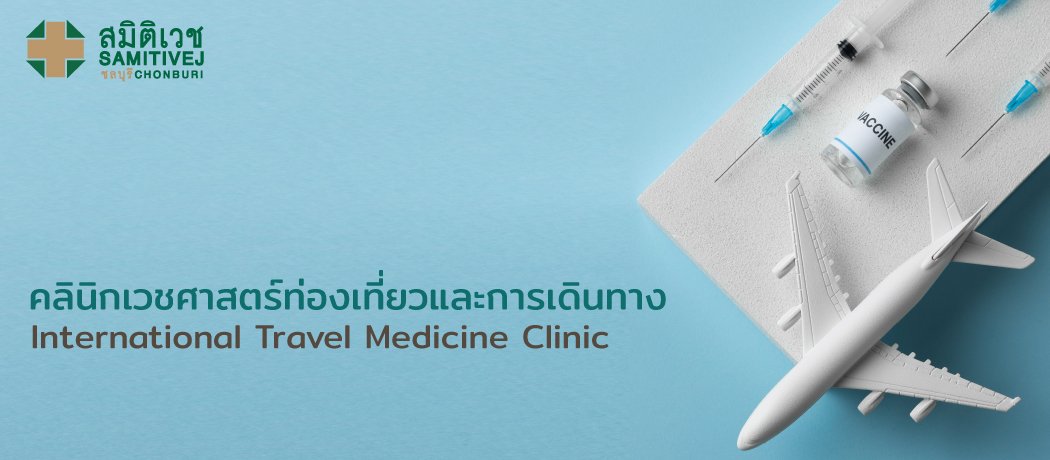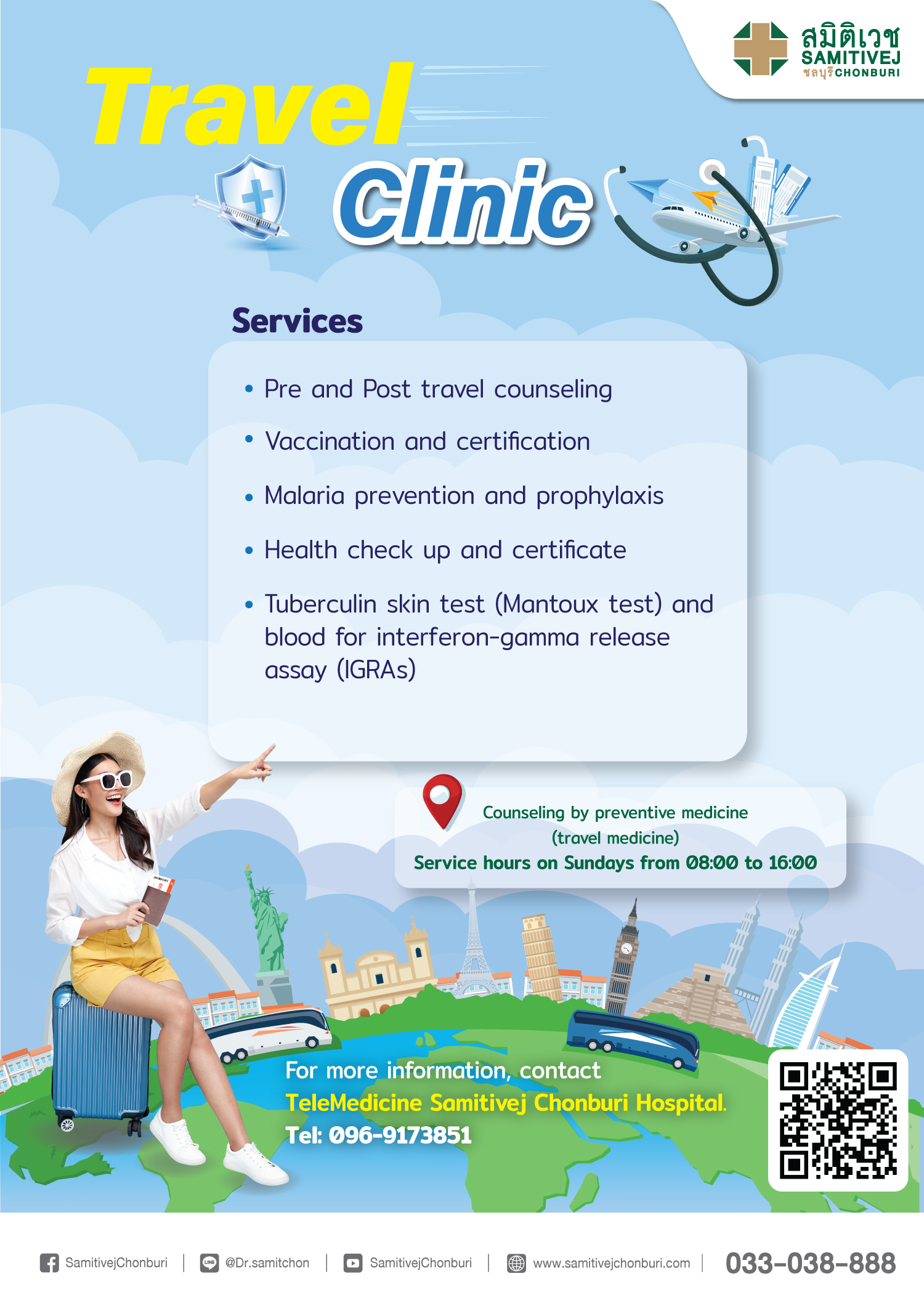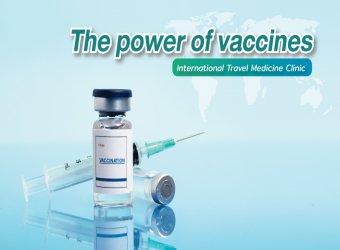
Travel Clinic
Travel Clinic is a special clinic that provide comprehensive medical care for both Thai and Foreign travelers. Our services include: pre and post travel counseling, recommendation of travel vaccines, malaria protection and prophylaxis as well as diagnosis and treatment of tropical diseases.
These are our services:
• Pre and Post travel counseling
• Vaccination and certification. view Price List
• Malaria prevention and prophylaxis.
• Health check up and certificate
• Rabies post-exposure treatment
• Travelers' diarrhea: Diagnosis and treatment
• Information center for tropical diseases and emerging diseases
• Laboratory diagnostic test for malaria, parasites, and other tropical diseases
• Tuberculin skin test (Mantoux test) and blood for interferon-gamma release assay (IGRAs)
• Treatment of medical diseases

Pre and Post travel counseling
To ensure a safe and enjoyable journey, travelers should seek medical advices regarding their health and endemic diseases. We provide all necessary health information before and after traveling worldwide.
Vaccination and immunization
We provide complete range of immunization and vaccination. All travelers who request for immunization should bring his/her medical immunization record and passport. Vaccination is given after counseling with our staff only.
Prophylaxis against Malaria
Since malaria in Thailand and in Southeast Asia is the multidrug resistance strain. The used of antimalarial prophylaxis should be advised by the qualified medical staff only. Over-the-counter antimalarial drug is not recommended. In our clinic, we provide counseling on basic malaria information, epidemiology, how to prevent yourself from malaria and whether antimalarial drug is recommended for you.
Health check up and certificate
Any persons who want to check up or need a health certificate can attend our clinic. We can provide standard physical examination, blood, urine exam and Chest X-ray. And health certificate is available after finished our process.
The doctor will assess the risk related to travel and recommend preventive measures, including vaccinations. Selected risk of infections when traveling to Thailand and prevention are listed below:
Food and water borne diseases:
- Hepatitis A
• The risk is Intermediate depending on eating habits and hand hygiene. Hepatitis A outbreaks among men who have sex with men (MSM) have been reported.
• Preventive measures: ensuring food and water safety, and practicing good hand hygiene and sanitization.
• Hepatitis A vaccine is available.
- Typhoid fever
• The risk is moderate depending on eating habits and hand hygiene. Those staying with friends or relatives or visiting smaller cities or rural areas could have a higher risk.
• Preventive measures: ensuring food and water safety, and practicing good hand hygiene and sanitization.
• Typhoid vaccine is available.
Vector borne diseases:
- Japanese encephalitis
• The risk exists in agricultural area throughout the country, especially for travelers with prolong stay (>1 month) or outdoor activities.
• Preventive measures: avoiding mosquito bites and applying insect repellant.
• Japanese encephalitis vaccine is available.
- Dengue
• The risk exists throughout the country, more common in a rainy season.
• Preventive measures: avoiding mosquito bites and applying insect repellant.
• Dengue vaccine is available and could be considered for specific group of international travelers (ex: long term travelers or travelers who had a prior dengue infection)
- Malaria
• The risk exists in certain district bordering Myanmar, Malaysia, Laos, Cambodia and some islands
• Preventive measures: avoiding mosquito bites and applying insect repellant.
• Malaria chemoprophylaxis is available although it is not recommended for general travelers.
Disease transmitted by mammal exposure:
- Rabies
• Rabid dogs are commonly found in Thailand and Chonburi was reported to be among the top five. Travelers who are more likely to encounter rabid animals include adventurers, animal handlers, field biologists, or visitors to rural areas.
• Preventive measures: avoiding mammals bites (including dog, cat, rat, bat and monkey), thoroughly clean the wound and visit the hospital ASAP if getting bitten.
• Rabies pre- and post- exposure vaccine is available.
Blood and sexual transmitted infections:
- Hepatitis B
• The prevalence in Thailand is high-moderate: 5-7%
• Preventive measures: avoiding contaminated equipment during medical, dental, cosmetic procedure or drug injection; and practicing safe sex.
• Hepatitis B is available.
Respiratory and droplet infections:
- Measles
• Cases of measles are on the rise worldwide. Travelers are at risk of measles if they have not been fully vaccinated.
• Preventive measures: Measles containing vaccine, ex: measles-mumps-rubella (MMR) vaccine.
Routine Vaccine
Make sure you are up-to-date on all routine vaccines before every trip. Some of these vaccines include:
- Chickenpox (Varicella)
- Diphtheria-Tetanus-Pertussis
- Influenza
- Measles-Mumps-Rubella (MMR)
- Polio
- Shingles
Recommended Vaccine for adult aged ≥ 65 Years or Elderly
Influenza Vaccine (1 dose annually)
This risk is due in part to changes in immune defenses with increasing age. While flu seasons vary in severity, during most seasons people 65 years and older bear the greatest burden of severe flu disease. Vaccinations help to stimulate the body’s immune system and are effective in preventing the severity of flu virus up to 90%.
Diphtheria-tetanus-acellular pertussis (Tdap) vaccine
Spores of tetanus bacteria are everywhere in the environment, including soil and dust. The disease could be prevented by the vaccine. The vaccination also prevents diphtheria and pertussis, which is particularly important for geriatric patients who may frequently come into contact with infant family members. They may risk passing on the condition or contracting the condition if their immune system is not working well enough. Those elderly patients who have never received the Tdap vaccination before are advised to have an initial course of Tdap vaccination, with a booster vaccination (Td or Tdap) every 10 years thereafter.
Pneumonia Vaccine
Patients over the age of 65 years are categorized as being at risk of developing severe pneumococcal infections or streptococcal pneumonia. These conditions have the potential to enter the bloodstream or cause meningitis after entering the brain tissue. The streptococcal pneumonia vaccination is 68–78% effective in controlling the condition.
Shingles vaccination
Patients are at a much higher risk of developing shingles after they reach the age of 50 years. The potential complications that can arise from such an infection are a burning sensation of the areas of skin affected by the virus, corneal wounds and conjunctivitis. Additionally, elderly patients tend to experience much more severe symptoms, for example encephalitis or a rash that can present itself in various locations around the body. Their symptoms also last longer than they do in younger people, so the shingles vaccination is advisable as it can reduce the chances of contracting the infection and at the same time decrease the risk of any of the aforementioned complications.
——————————————————————————————————————————————————————————————————————————————————
Location : Building B, 1st floor Service Hour: 8.00 – 8.00 P.M.
Contact : 033-038853
E-mail : [email protected] // Line ID: @schinter
Location : ชั้น 2 อาคาร B
Opening Hours : 08.00-17.00
Tel no. : 096-917385







 Find a doctor
Find a doctor